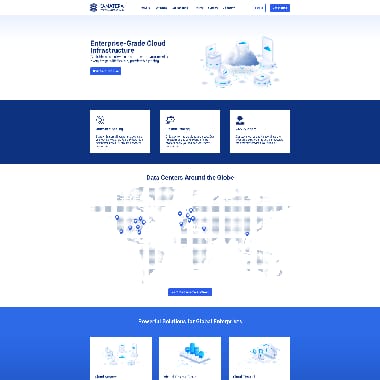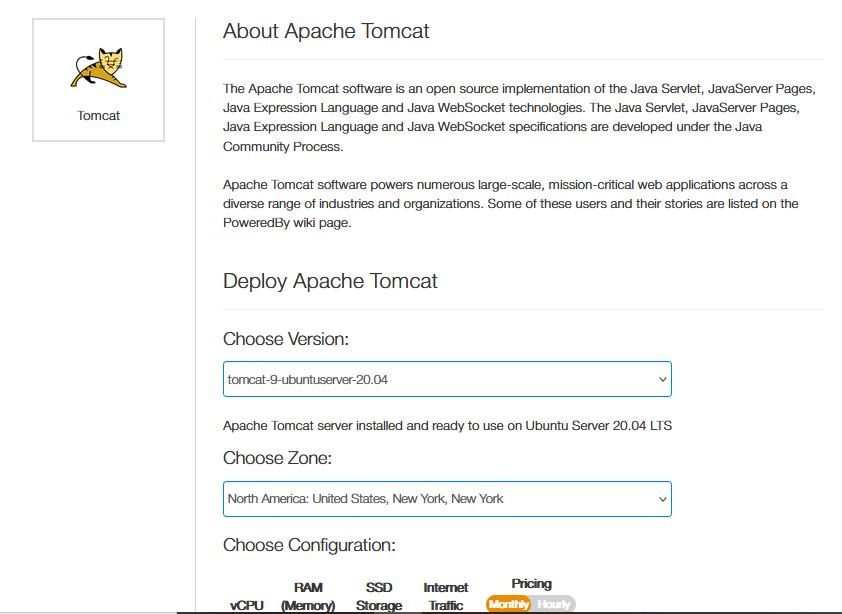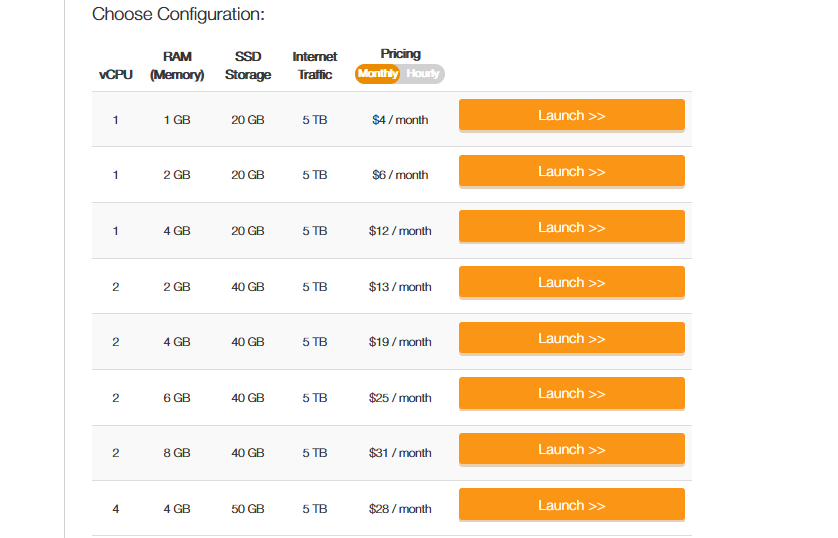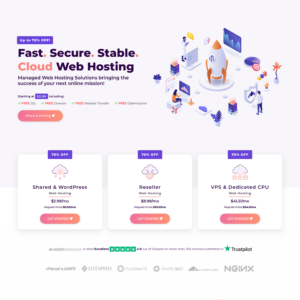Tomcat is an open-source Java server environment and servlet container associated with web applications written in Java Programming. Tomcat facilitates the development of web pages on HTML, XML and other document systems.
Tomcat hosting refers to a hosting service that provides the required configuration tools for Java developers to host Java codes built for web applications that run on a Java Virtual Machine.
At HostAdvice, we reviewed some of the hosting providers on the market to ascertain the ones that meet all the technical requirements and tools to run a Java code or Tomcat JSP website or application. Our experts bought, tested and ranked the top 5 Tomcat hosting providers using our rating methodologies as well as user reviews from Java developers.
Key Points to Consider When Choosing the Tomcat Hosting Providers
- Check whether Tomcat is pre-installed or if you need to install it manually
- Choose a host that guarantees regular Java updates, mod_jk module and cPanel control panel.
- Ensure the host offers root access to control your Java server environment
- Choose a hosting provider with robust security measures to protect your Tomcat applications and data from malicious attacks.
- Look for a hosting provider that guarantees high uptime and reliability, as downtime can affect the availability of your web applications.
Here Are the Top Tomcat Hosting Providers
- Kamatera: Overall Best Tomcat Hosting Provider
- HostArmada: Best Java Tomcat Hosting for Performance and Scalability
The Top Tomcat Hosting Providers (Bought and Tested)






Kamatera offers a cloud service that allows you to select and deploy Apache Tomcat software by choosing from a variety of configurations and more packages to suit your needs. With Kamatera, you can launch your Tomcat server with their 30 day free trial to run your Java codes. The cloud infrastructure allows you to deploy Tomcat in seconds with no commitment or setup fee required and the option to cancel any time.
- Overall Score: 4.8
- Features: 4.8
- Reliability: 5.0
- User Friendly: 4.9
- Support: 4.9
- Pricing: 4.7

Features (4.8): Kamatera offers the option to select the latest Tomcat versions from the drop down provided as well as the nearest server location to deploy your server. You will also get features like Root and Administrator access, CPU monitoring, Instant Server configuration, Solid State Drives, Advanced monitoring and automation tools, Unlimited scale-up and scale-out and more.
Reliability (5.0): This host uses state of the art data centers and guarantees 99.9% uptime SLA.
User-Friendly (4.9): Kamatera Tomcat hosting service comes with complete flexibility. You will be able to scale up/down anytime if needed plus full root access, and connection via SSH / Putty.
Support (4.9): With Kamatera, you can reach their customer help via Live chat or phone call. Plus, you can access their knowledgebase to review resources that will guide you on how to use some of their services.
Pricing (4.7): Each of the servers below have been configured to help you launch your Tomcat software on Kamatera’s cloud server. You can select the one that best suits your needs with an option to pay monthly or hourly depending on your project goal.

PROS
- Offers great backup options
- 30 day Free trial
- Guarantees 99.95% uptime SLA
- Reliable high-end data centers
- Deploys Tomcat in seconds
- Custom configuration packages
- No Setup fee
CONS
- No Free backups






Rating Based on Expert Review:
- Overall Score: 4.6
- Features: 4.5
- Reliability: 4.7
- User-Friendly: 4.4
- Support: 4.6
- Pricing: 4.5
HostArmada is a standout choice for Java Tomcat hosting, known for its exceptional performance and scalability. This hosting option is tailored for developers and businesses that rely on Java applications and require a robust Tomcat environment. With its strong emphasis on reliable server performance and scalable resources, HostArmada provides an ideal platform for running Java-based web applications and services.
Features: HostArmada offers features that cater specifically to Java developers, including easy Tomcat installation, support for various Java frameworks, and ample resources for application deployment and management.
Reliability: Prioritizing high uptime and server stability, HostArmada ensures that Java applications run smoothly with minimal disruptions, which is essential for maintaining professional web services.
User-Friendly: While catering to the needs of developers, HostArmada also maintains a user-friendly interface, simplifying the management of Java applications and server resources.
Support: Recognized for its excellent customer service, HostArmada provides specialized support for its Java Tomcat hosting, assisting clients in managing their Java environments effectively.
Pros and Cons:
- Tailored hosting solutions for Java and Tomcat applications
- Strong focus on performance and reliability
- Dedicated and knowledgeable support for Java developers
- May require a higher level of technical expertise for full utilization
- Pricing could be a consideration for smaller projects or beginners
Tomcat Hosting Providers – Final Recommendation
When choosing a tomcat hosting provider, it is important to consider several key parameters to ensure you get the best possible hosting experience.
- Look for a provider that offers a reliable and fast hosting service with high uptime guarantees and fast loading times.
- Consider the level of technical support and expertise the provider offers, as this can be crucial in resolving any issues that may arise.
- Check the provider’s reputation, customer reviews, and track record to ensure they have a good history of providing quality hosting services.
Once you choose a suitable tomcat hosting provider, the next step is installing and hosting your Java applications. This can be done easily with most hosting providers, as they typically offer easy-to-use control panels and tools for installing and managing Tomcat. Simply log in to your hosting account, locate the tomcat installation tool, and follow the prompts to install tomcat on your server.
Once tomcat is installed, you can deploy your Java applications to your server and serve your users with high-performance and reliable hosting. You can check the step by step on how to install Java and Tomcat later in this review.
Ranking comparison between the Top Providers
Our Ranking Methodology: How do we rank?
- User reviews30%
- Performance and reliability10%
- Types of hosting offered5%
- Customer support10%
- Site speed8%
- Bandwidth and storage3%
- Traffic volume4%
- Scaling potential4%
- Features included10%
- Ease of use4%
- Starting price4%
- Money back guarantee3%
- Other factors5%
At Hostadvice, we strive to deliver high-quality hosting reviews by constantly refining our review methodologies to ensure accuracy and relevance, helping you make informed decisions when choosing your tomcat hosting provider. Our team has compiled an overview of each host based on their tomcat hosting service, taking into account essential criteria such as features, reliability, user-friendliness, customer support, and pricing.
We recommend selecting a Tomcat hosting provider that offers SSH access for installing Tomcat and allows customization of server resources to suit individual needs. In addition, we evaluated three crucial criteria during our selection process:
- Pre-installed Tomcat or manual installation
- Tomcat version and support
- Basic hosting needs, including storage, uptime, bandwidth, and support
These criteria enabled us to identify the top 5 Tomcat hosting providers, providing you with an opportunity to choose the ideal host for your Tomcat hosting needs.
What is Tomcat Hosting?
Tomcat hosting allows you to deploy Java applications to a server that has Tomcat installed, providing a reliable and secure hosting service.
Tomcat is an open-source Java Servlet container that supports Java Server Pages (JSP) and Java Servlets. Hosting providers that offer Tomcat hosting typically have Tomcat pre-installed on their servers or allow for manual installation.
With Tomcat hosting, you can enjoy features such as different Tomcat versions, pre-installed Java frameworks, and custom resource allocation, providing a tailored hosting experience to meet your specific needs.
Tomcat comprises components like Jasper, Catalina, and Coyote, which work together to enable the parsing and compilation of Java server pages into Java servlet code, as well as delivery and request processing. Overall, Tomcat hosting provides a convenient and efficient platform for Java developers to host their Java applications.
Step by Step on how to Install Java and Tomcat
Here’s a step-by-step guide on how Java developers can install Tomcat and Java to host Java applications:
Step 1: Install Java
Before installing Tomcat, you need to install Java. Most hosting providers offer Java installation by default. However, if you are using a server that doesn’t have Java installed, you can follow these steps:
1.1. Download the Java Development Kit (JDK) from the Oracle website.
1.2. Install the JDK on your server. The installation process may vary depending on your operating system.
1.3. Set up the JAVA_HOME environment variable to point to the directory where you installed the JDK. You can do this by adding the following line to your server’s environment variables:

1.4. Add the JDK’s bin directory to your system’s PATH environment variable so that you can run the java command from any directory. You can do this by adding the following line to your server’s environment variables:

Step 2: Install Tomcat
Once you have installed Java, you can proceed to install Tomcat. Here are the steps to install Tomcat:
2.1. Download the latest version of Tomcat from the Apache Tomcat website.
2.2. Extract the downloaded archive to a directory on your server. For example, you can extract it to /opt/tomcat.
2.3. Set up the CATALINA_HOME environment variable to point to the directory where you extracted Tomcat. You can do this by adding the following line to your server’s environment variables:

2.4. Add the Tomcat’s bin directory to your system’s PATH environment variable so that you can run the startup.sh and shutdown.sh scripts from any directory. You can do this by adding the following line to your server’s environment variables:

Benefits of using Tomcat Hosting for Java web apps?
Here are the benefits of using Tomcat for hosting Java applications:
- Tomcat is known for its strong security features, which can help protect your web applications from attacks and vulnerabilities.
- Tomcat is an open-source web server and servlet container available for free.
- Tomcat is designed to provide a pure Java HTTP environment for running Java web applications.
- Tomcat is designed to be easy to configure and run, making it a great option for developers new to web application development.
How Should you Choose your Tomcat Hosting Provider?
Before choosing a tomcat hosting provider, consider the following factors to ensure you get the best hosting experience.
Performance and reliability:
- Does the tomcat host provide a pre-installed tomcat or allow manual installation?
Consider the setup time, technical expertise needed to get your server up and running, and the tomcat version available. Pre-installed tomcat can save time and effort, while newer versions may offer better performance and security features.
Features included:
- Does the host provide the latest tomcat version and support?
You should check if the host offers the Tomcat version in JDK, MySQL, and PostgreSQL and support for Java frameworks like Java servlet, JSF, Struts, Hibernate, and Spring. Having the latest version and support for various frameworks can ensure compatibility with the latest technologies.
Money-back guarantee:
- Will the host refund users or have a refund policy in place?
You should look for a host with a transparent refund policy, as it can protect your savings and investment. A money-back guarantee can also provide peace of mind and allow you to try the service before committing long-term.
Server resources:
- Will the host provide the basic hosting needs required to deploy Java apps?
Before choosing a host, you should ensure that it provides certain basic hosting features and resources, from storage to uptime, bandwidth, level of support, and root access or control. This can ensure that your Java apps run smoothly and efficiently.
Customer support:
- Does the host have the technical support team to address any issue you might have?
You should check if the host provides a certain level of support to help resolve any issue on Live chat, phone, email, and other supports like a knowledgebase, and academy to provide guidelines on how to use their hosting services. Good customer support can provide quick and effective solutions to any technical problems.
User Reviews:
- Does the host have enough reputation in terms of quality of service delivery?
Reading feedback and reviews can provide valuable insights into a host’s quality of service delivery. You should look for a host with positive reviews and a good track record of providing reliable hosting services. Factors to look out for when evaluating the track record of a specific host include the uptime and reliability of their servers, the quality of service delivery and some of the positive feedback provided by previous users.
You can also read more reviews on Hostadvice to check user reviews and see what other users recommend for tomcat hosting.













